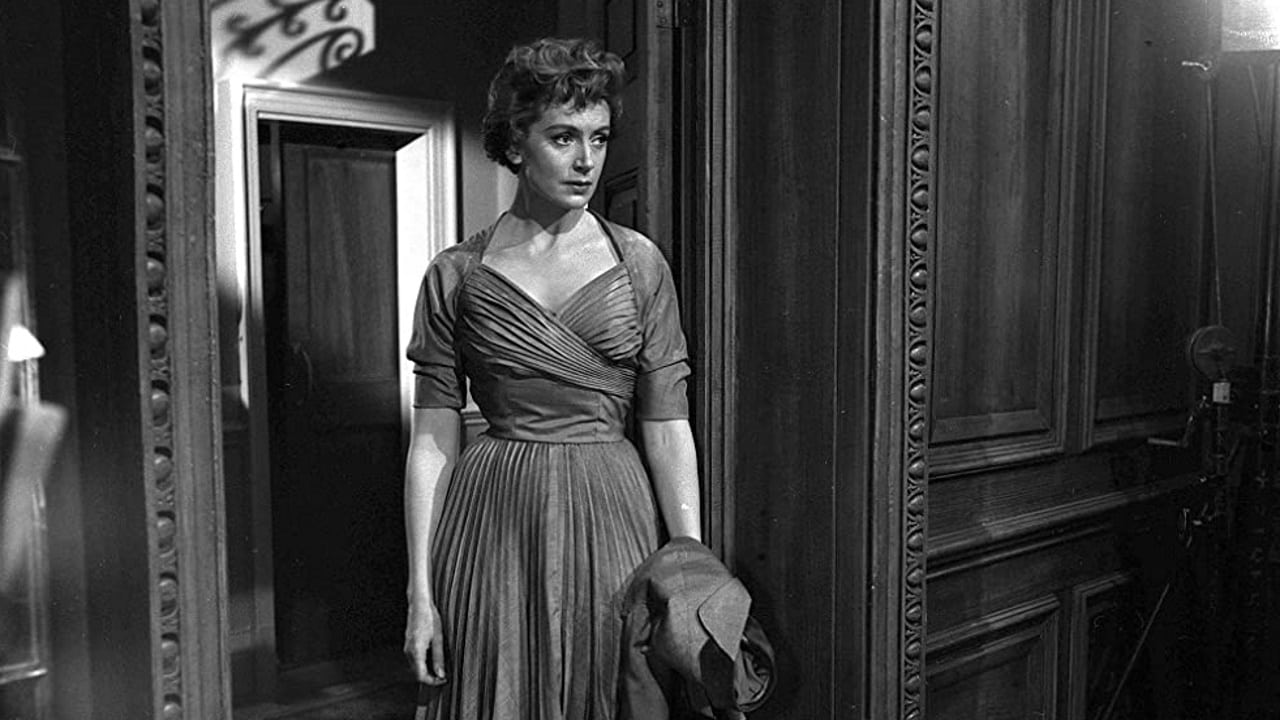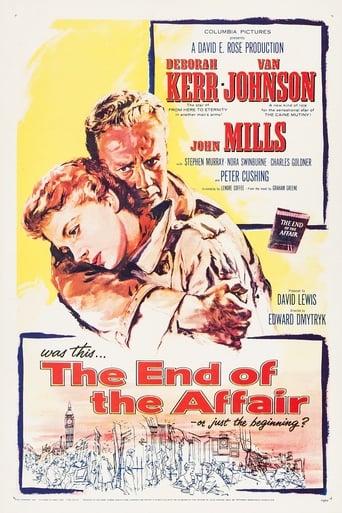



Clever and entertaining enough to recommend even to members of the 1%
View MoreTrue to its essence, the characters remain on the same line and manage to entertain the viewer, each highlighting their own distinctive qualities or touches.
View MoreIt is an exhilarating, distressing, funny and profound film, with one of the more memorable film scores in years,
View MoreIf you like to be scared, if you like to laugh, and if you like to learn a thing or two at the movies, this absolutely cannot be missed.
View MoreThe two lovers in this picture who were having an affair, namely: Deborah Kerr, (Sarah Miles) and Van Johnson, (Maurice Bendrix) both bored me to death with their flashbacks about their so called love affair. The entire picture went around in complete circles along with bombs exploding in London during World War 11. The End of the Affair should have been over before it started, I doubt very much if this couple even enjoyed their so called sexual affair, the both acted way out of character and Van Johnson and Deborah Kerr were not suited for each other as actors in this film. It is a depressing horrible film and it really gave me a Headache to watch.
View MoreThis is an astonishing artifact from 1955 -- astonishing because it is so grownup and sophisticated in its outlook, and because it grapples with moral complexities and ambiguities that English language films of this period never went near. An adulterous affair begun with a certain amount of cynicism on both sides grows into a true and passionate love affair, which in turn raises issues of guilt, trust, duty, self-denial and religious belief. As a story, it holds our interest and causes us to wonder where it will end. As a parable and philosophical meditation on belief and its role in love and contemporary life, it is both stimulating and unexpectedly moving.That a novel as layered and difficult was attempted with major stars at this time is surprising enough. That THE END OF THE AFFAIR succeeds on so many levels seems miraculous, especially in the context of most mainstream film product of the mid-'50s.Van Johnson is not as expressive or deep an actor as the excellent Deborah Kerr and Peter Cushing (and John Mills, Michael Goodliffe and Nora Swinburne) yet his character's relaxed masculinity, reluctant anguish and saturnine, rather malicious jealousy are well-conveyed, and he manages to be a presence you remain interested in. As Greene's Mary Magdalene character, the woman in whom the sacred and profane are mingled, Kerr is terrific in a complex role that is an interesting inversion of her promiscuous, childless woman in the far more famous and popular FROM HERE TO ETERNITY of just two years before. ETERNITY, done for Columbia, the same studio that released this, was far more shallow and conventional in the way it dealt with Kerr's Karen Holmes and her redemption. Just as shallow (and evasive) was TEA AND SYMPATHY, which Kerr did after this, and which received far more fame and attention than was merited. This 1955 version of THE END OF THE AFFAIR deserves to be much better known and remembered, and all concerned deserve belated kudos for attempting such a provocative film in the midst of Hollywood's synthetic movies of the period. I saw this after recording it on TCM, and would like to see it scheduled in prime time, to perhaps begin to get the wider audience it deserves and to hear commentary from moderator Robert Osborn (for that matter, he ought to do one hour interviews with both Kerr and Johnson while they are still around).Let the rediscovery and rehabilitation of this good film begin . . .
View MoreThis is the first version of the movie Neil Jordan remade in the late nineties.Based on a Graham Greene novel,it looks like a melodrama ( the chandelier scene is pure poetic melodrama) but with a strong metaphysical side.The construction of the film is complex,showing the same events from two points of view.Sometimes you may lose the vital lead ,for a lot of important things are not necessarily on the screen.If the movie is successful ,it's because of Deborah Kerr's extraordinary skills.She is sensational in her part of an unhappy woman,in search of something really worthwhile.Whereas Maurice (Van Johnson) is all passion and jealousy,her quest is much more demanding.A lot of us have ,at least once in our lives,asked God for something.And if this wish comes true,is it proof positive that God exists?And if the person who prayed Him is an atheist?Does it mean that she has got to change her way of thinking? That she is indebted to Him?That's Sarah's moral dilemma ,lost between her love for Maurice and her moral concern,and trying to find her way ,helped by two men Father Crompton and Smythe.Deborah Kerr's fans should watch this .At the time,Edward Dmytryk had probably moral concern too.
View MoreThis is not a great film, but it is better than many critics said it was when the 1999 remake came out. THE END OF THE AFFAIR was one of the key novels of Graham Greene in the 1950s that delved into his intense Catholicism. With a background of World War II, neighbors Maurice Bendrix and Sarah Miles (Van Johnson and Deborah Kerr) have a deep, passionate romance. But they are separated for a year or so, and when they try to resume the relationship (or when Johnson tries to resume the relationship - Kerr seems relatively hesitant). It turns out that, due to personal experiences, Kerr has had a religious revelation. She is listening to a Catholic priest. She is also trying to help a man with a deformity (a birthmark) on his face who hates God. She is also concerned about the spiritual health of Johnson and of her actual husband Henry (Peter Cushing, in a very moving - and non-horrific role). The film shows how Kerr affects all the lives around her, even beyond her death after a short illness (as the novel does). Yes, it is too talky - novels about ideas (and here it is the age old question of what is real love, the spiritual or the profane)usually are. Greene, good Catholic exponent that he was, would have said that Kerr's devotion to her God was an outpouring of divine true love to her fellow creatures. Her death is not a tragedy. But Greene the novelist and part-time realist cannot leave it there. Johnson's character is bitter at the end of this remarkable novel, and at the end of the film. And his bitterness is directed at the source of that love that triumphed over his profane one.
View More